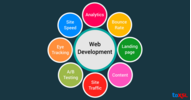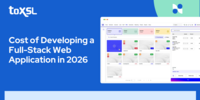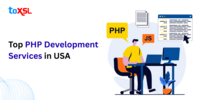- Apr 16, 2025
Share this post on:

We are living in a fast-paced world of web development where developing scalable and secure applications is essential. With the explosion of digital platforms, the demand for frameworks that can handle complex requirements efficiently has never been higher. Yii, a high-performance PHP framework, has become the best choice for developers and organizations focused on delivering robust, secure, and scalable web applications.
Yii stands for "Yes, It Is!" and is a free, open-source PHP framework designed for the rapid development of modern web applications. Since its inception in 2008, Yii has gained popularity for its simplicity, extensibility, and performance. It is particularly well-suited for projects ranging from small websites to large-scale enterprise applications, because of its component-based architecture and caching support.
Benefits of Yii App Development for Business
Yii offers numerous benefits that can help businesses in numerous ways. Let us shed some light on the benefits of Yii app development services for business.
Fast Development: Yii helps developers in faster app development. It has many tools and features that make creating complicated apps easier and quicker. This helps developers finish their work on time or launch new products quickly. Because of this, businesses can make apps faster and meet their deadlines or release products sooner.
High Performance: Yii is a very fast framework and works well. Due to its speed and efficiency, it is a great choice for websites that need to work fast. The framework also uses caching technology, which helps it work even faster.
Security: Yii has security features built in, such as login and permission systems.It has in build tools to protect business against hacking tricks such as SQL injection and cross-site scripting. Also, it is highly customizable and is a good choice for companies that handle private information, like medical or financial records.
Easy to use: Yii is special because it has an easy-to-use interface. It gives developers tools and features that help them make web apps without needing a lot of coding skills. Because of this, Yii is a good choice for companies that want web developers who don’t know much about PHP.
Flexible: Yii is a flexible system that has plugins and add-ons. These add new features to fit the needs of different businesses and many kinds of apps. Yii is a good choice for companies that want to make special web applications.
Best Practices of Yii Development
Here are a few best practices of Yii development. By following these best practices, Yii developers can create secure, scalable, and maintainable web applications that are ready to meet modern business demands:
Follow MVC Principles Strictly: Ensure to different business models, user interface, and request handling to ensure clean, maintainable, and reusable code. For large applications, always use base model classes and extend them in sub-applications for specific functionality, keeping models organized.
Understand Yii’s Architecture: Understand: Yii’s component-based structure and core concepts. This include models, views, controllers, and components, to use the framework’s full potential.
Effective Database Management: Use Yii’s Active Record for object-oriented database interaction, and implement database migrations for version control. Optimize queries and use Yii’s Query Builder for complex operations while maintaining security against SQL injection.
Optimize Performance with Caching: UseYii’s built-in caching mechanisms. This includes data caching, fragment caching, and page caching, to reduce database load and speed up response times. Also, choose appropriate cache components such as file, memory, database based on your application’s needs.
Prioritize Security: Always validate and filter all user inputs and escape all outputs to prevent vulnerabilities. Use Yii’s built-in security features such as input validation, output filtering, secure authentication, role-based access control, and encrypted data storage.
Use Gii for Code Generation: Leverage Yii’s Gii tool to generate models, controllers, CRUD operations, and forms, accelerating the development process.
Modularize Your Application: Structure large applications into modules e.g. admin, API, anduser to keep code organized and facilitate teamwork and scalability.
Leverage Extensions and Widgets: Utilize Yii’s rich ecosystem of extensions and widgets to add features efficiently and improve user experience without reinventing the wheel.
Write Clean, Maintainable Code: Ensure to follow Yii’s coding standards and best practices for naming, formatting, and organization. Keep controllers thin by placing business logic in models or service classes.
Implement Thorough Testing: Use Yii’s support for unit, functional, and acceptance testing to ensure reliability and catch bugs early in development.
Plan for Scalability: Design your application with future growth in mind, using Yii’s modular architecture and cache components to support increased traffic and complexity.
Stay Updated with the Community: Keep up with Yii updates, security patches, and best practices shared by the active Yii community to ensure your application remains secure and efficient.
How much does Yii web development cost?
Are you thinking about developing a website or app with Yii? Here is what you need to know about the costs:
Is Yii Free?
Yii itself doesn’t cost anything. It’s open-source, so you don’t pay for the framework. That means you can download it, use it, and develop it as much as you want without any license fees.
What Will You Pay For?
The real cost comes from hiring people to build your site or app. Here’s how it usually works:
Hourly Rates: If you hire a Yii developer, the hourly price may be anywhere from $12 to $70 according to an hour, depending on where they live and how much experience they have. However, the price varies according to the developer's location. In places such as the US, a mid-level Yii developer might charge around $43–$58 per hour. However, in countries like Ukraine or India, it may be as low as $12–$22 per hour for a junior or mid-level developer.
Monthly or Yearly: Some organizations provide month-to-month or every-year packages. For a full-time Yii developer, you may pay about $2,000–$7,000 per month, depending on their skills and location.
Project-Based: If you want to develop the whole website or app, the total rate depends on how large and complex your project is. A simple website might be some thousand dollars, and a complex can have value greater than that of a simple website.
What Else Can Affect the Price?
Experience: More experienced developers cost more, but they usually work faster and make fewer mistakes.
Location: Developers in the US, UK, or Switzerland charge more than those in Eastern Europe or Asia.
Team Size: Hiring a whole team (designers, testers, project managers) costs more than just one developer.
Extra Services: Things like ongoing support, updates, and hosting are extra costs to keep in mind.
Hidden Costs?
Don’t forget, if you hire someone as a full-time employee, there are extra costs like benefits and equipment. That’s why many businesses prefer to hire remote or freelance Yii developers—they save money on all those extras.
Core Features of Yii
Here are the core features of the Yii Framework.
Model-View-Controller (MVC) Architecture:
Yii implements the MVC design pattern. This pattern separates business logic, user interface, and input handling, making code more organized, maintainable, and scalable. The version represents records and business rules, the view handles the presentation layer, and the controller manages communication between the model and view.
Database Access and Active Record:
Yii provides multiple ways to interact with databases:
Database Access Objects (DAO): Offers a uniform interface for different database management systems, making it easy to switch databases without changing code.
Active Record: Treats database tables as PHP classes, allowing developers to work with data using object-oriented syntax rather than raw SQL.
Query Builder: Facilitates the creation of complex SQL queries in an object-oriented way, reducing the risk of SQL injection.
Advanced Caching:
Yii supports a layered caching scheme, including:
- Memory-based caches (MemCache, APC)
- File-based caching
- Database caching
- Dummy cache for development environments
These caching options help improve application performance and scalability by reducing database load and speeding up page rendering.
Security Features:
Yii comes with built-in security measures:
- Input validation and filtering
- Output encoding to prevent XSS
- CSRF and cookie attack prevention
- Authentication and authorization systems for managing user access
- Password hashing and secure session management
These features help developers build applications that are resilient to common attacks.
RESTful API Support:
Yii help businesses develop RESTful web services, support modern web and mobile applications. Yii framework offer tools for routing, serialization, authentication, and response formatting, making API development efficient and secure.
Code Generation with Gii:
Gii is powerful code generation tool offered by Yii that enables developers to generate models, controllers, forms, modules, and more using a web-based interface. Further, this tool enhances development process and ensures consistency across the application.
Testing and Debugging:
Yii offers integrated support for unit, functional, and acceptance testing.With that, Yii also includes debugging tools and detailed error handling that help help developers identify and fix issues.
Conclusion:
ToXSL Technologies is a leading Yii web development services provider company, renowned for developing the best solutions for businesses worldwide. We have a team of experienced Yii developers who are well-versed in the latest version of Yii and know how to deliver the best solutions to businesses worldwide. So, what are you waiting for? Invest in our web development services and leverage our services. Request a quote.
Frequently Asked Questions (FAQs)
1. What types of applications can be built with Yii?
Yii is suitable for a wide range of web applications, including e-commerce platforms, content management systems, RESTful APIs, forums, and enterprise portals.
2. How does Yii ensure application security?
Yii provides built-in security features such as input validation, output filtering, CSRF/XSS protection, and role-based access control (RBAC) to guard against common web vulnerabilities.
3. Is Yii suitable for large-scale or high-traffic applications?
Yes, Yii’s high performance, modular architecture, and advanced caching mechanisms make it ideal for scalable, high-traffic web applications.
4. What is Gii, and how does it help developers?
Gii is Yii’s code generation tool that automates the creation of models, controllers, and CRUD operations, significantly speeding up development and ensuring consistent code structure.
5. Can Yii be integrated with third-party services and APIs?
Absolutely. Yii supports RESTful API development and can be easily integrated with external services, making it flexible for modern web application requirements.











